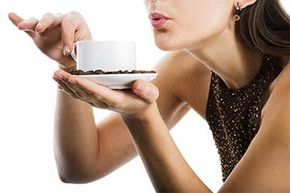Well into his second cup of coffee, your coworker leans in to whisper something to you. But rather than sharing the latest office gossip, he inadvertently shares something else: coffee breath. One whiff and it's enough to make you run for the door -- and feel a little paranoid about your own breath, now that you've had your fill of coffee, too.
Coffee breath is a relatively common phenomenon, one that plagues coffee-lovers the world over. But why does coffee make your breath smell so bad?
Advertisement
For starters, coffee can cause xerostomia, more commonly known as "dry mouth." That's because coffee contains caffeine -- up to 200 milligrams in a single 8-ounce or 237-milliliter cup -- one of the chief culprits of decreased saliva and, in turn, a dry mouth. Having a dry mouth is more than an inconvenience. When there is not enough saliva, the conditions are ripe for bacteria and fungi to thrive, and this can lead to bad breath. Plus, a lack of saliva can make it difficult to wash away and digest particles of food clinging to the tongue or teeth, and it can even promote tooth decay [source: NIH].
The type of coffee you drink can heighten its effect on your breath. For example, an espresso containing a concentrated dose of 75 milligrams of caffeine per ounce will give you hard-core coffee breath, not only because of its caffeinated qualities but because its intense flavor will linger. In fact, most bad breath follows a general rule of thumb: The more potent the smell of the liquid or food that is ingested, the more potent its effect on your breath. It's the same reason why eating onions or garlic will lend your breath an unsavory smell for hours on end [sources: Mayo Clinic, Live Science].
The other cause behind coffee breath isn't actually your coffee. It's what you put in it. Loading up a cup of coffee with cream, milk or even artificially flavored non-dairy creamer fuels the overgrowth of bacteria in your mouth. Stirring in sugar, an ingredient on which bacteria thrive, will put bacteria into overdrive. To make matters worse, coffee is highly acidic, yet another condition that causes bacteria to reproduce with alarming efficiency.
One solution to help combat coffee breath is to drink a watered-down cup of coffee without added cream or sugar. As unappealing as this may sound, it could mean the difference between stinky or manageable breath. Another idea is to switch to tea. Still hot and caffeinated (up 70 milligrams per serving), tea is far less acidic than coffee and won't cause the same bad-mouth odors. If you just can't manage to give up your cup of joe, chase it with a glass of water to encourage saliva production and, if possible, try slipping away to brush your teeth and tongue [source: Roston].
Advertisement
